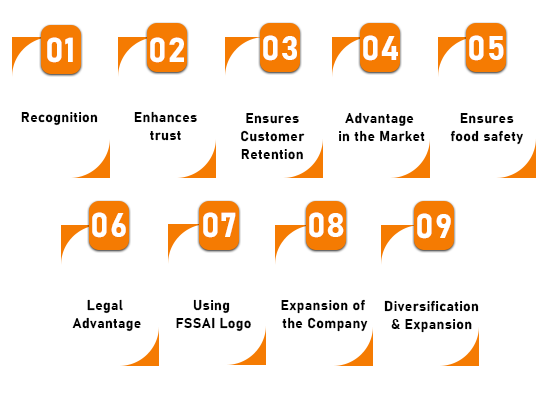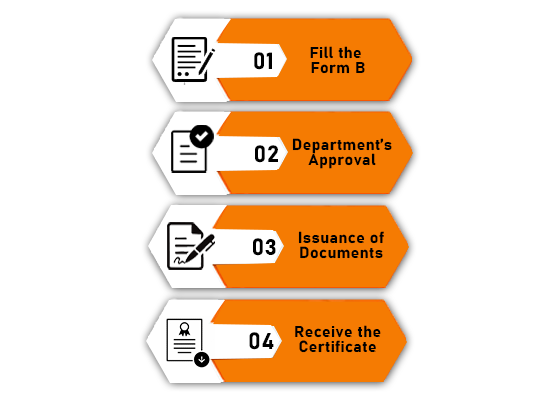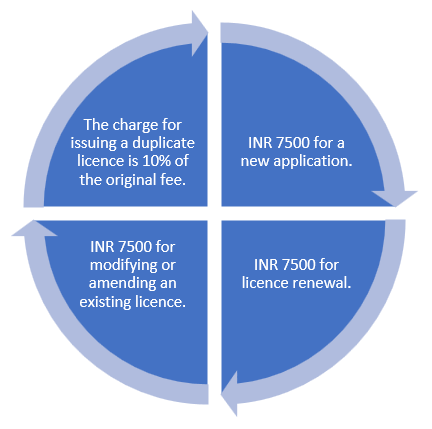Fssai Central License
Do you want to take your food retail business to the next level? Obtain a central FSSAI licence to help you achieve your entrepreneurial goals. Anywhere in India, you’ll find it easy to do business.
- Expert assistance
- Complete online Process
- End To End Compliances solutions
- Track Application Status

3 Reasons Why Customers Love Us
Professionalism
Much, much more affordable than other professionals

All in One
Leave legal, tax and compliance to us

We Deliver
1200+ authentic reviews, industry leading average of 4.4/5
Brief on Central FSSAI License
The Food Safety and Standards Authority of India (FSSAI) is responsible for monitoring and regulating food-related businesses in India. This body was created to safeguard the hygiene and safety of food items by decreasing the practise of food adulteration and the sale of low-quality products.
Food firms that engage in operations such as manufacturing, storage, distribution, and retailing food goods must get a Central Food License. FSSAI Licenses are issued as either a state licence or a central licence, depending on the nature of the activities carried out by the food industry.
It establishes the qualifying requirements for food businesses that are under the jurisdiction of the Central Licensing Authority. If a food company operator is dealing with several types of businesses with varied eligibilities in a same location, the food business operator might choose a single highest licence for all of the businesses based on the eligibility criteria.
The authority issues a Food License to a company that is involved in operations involving food or related items for human consumption and establishes the rules and regulations that must be followed by food business operators in India. In India, there are two types of FSSAI licences: State FSSAI Licenses and Central FSSAI Licenses.
Eligibility Criteria of Central FSSAI License
- Milk cooling systems designed to handle or process more than 50,000 litres of liquid milk per day or 2500 million tonnes of solid milk per year are included in milk units.
- Vegetable oil processing and production equipment, including oil expeller units, produce more than 2 million tonnes per day using solvent extraction methods and refineries.
- Every day, slaughterhouses handle more than 50 large animals, 150 small animals, or 1,000 poultry birds.
- Units that process more than 500 kg of beef per day, or 150 million tonnes per year.
- All of the food makers are private label.
- All of the units are 100% export-oriented.
- All food processing units, including re-labellers and re-packers, process more than 2 million tonnes per day, with the exception of rice, cereals, and pulses.
- Importers of food products, including culinary components and commercial additives
- Other than those with a controlled climate and cold environment, storage units having a capacity of more than 50,000 million tonnes.
- Storage that is cold or refrigerated and has a capacity of above 10,000 million tonnes.
- Cold storage with a volume of over 1000 million tonnes in a controlled atmosphere.
- Wholesalers with a revenue of more than Rs.30 crores each year.
- Retailers with annual sales of more than Rs.20 crores.
- Distributors with a revenue of more than Rs.20 crores each year.
- Suppliers with a revenue of more than Rs.20 crores each year.
- Caterers with a revenue of more than Rs.20 crores each year.
- Hotels with a five-star rating or above.
- Restaurants with a revenue of more than Rs.20 crores per year.
- Carriers with more than 100 cars and a yearly turnover of more than Rs.30 crores.
- Marketers with a yearly revenue of more than Rs.20 crores.
- Central government entities, such as the military, provide food catering services in establishments and units.
- With offices in major government departments, storage, wholesalers, and distributors are available.
- Seaports in several parts of India have food catering facilities.
Advantages of Central FSSAI License
Obtaining a food licence has various advantages for food operators:-

Recognition
The food licence and logo raise brand visibility and recognition among customers and the general public. In this digital age, people are becoming more conscious of the quality, standard, and hygiene of the food they consume. Before purchasing any food from outside, customers want to know that it is FSSAI certified. This gives them additional assurance that the product is consistent and free of toxins, artificial flavouring, and other contaminants. Furthermore, this provides the consumer with fair proof of understanding whether or not the goods in question is defective. As a result, there’s a considerably lower probability that dealers with a food safety licence will offer low-quality food. As a result, obtaining a food licence gives you a distinct advantage in fast expanding your customer base.
Enhances trustworthiness
A valid food licence enables businesses at all levels to improve and increase their trust.
Ensures Customer Retention
The FSSAI Logo aids in the client acquisition process.
Advantage in the Market
Food businesses with an FSSAI licence have a competitive advantage over their competitors in the same market.
Ensures food safety
It ensures the safety of food in terms of health and hygiene.
Diversification and Expansion
The FSSAI licence ensures that the business can expand and diversify quickly.
Legal Advantage
In general, everyone believes that obtaining a food licence would be a laborious task including numerous issues such as paperwork and unneeded documentation. They also think it takes a long time. There’s a common misconception that FSSAI central licencing costs are prohibitively expensive. They believe that obtaining a food licence will be a significant setback for a new business. The reality, on the other hand, is the polar opposite. Food permits are easy to obtain and can be purchased for a cheap price. The business that operates without a food licence faces a stiff penalty.
Using FSSAI Logo
The FSSAI only licences businesses that meet the greatest sanitary standards. You can use the logo on your menu card bags, pamphlets, and other items provided you have a food licence. The FSSAI emblem on a food product indicates that it is of higher quality than similar products. Customers can have more confidence in food standards if they have a valid FSSAI licence. Customers are now only purchasing a food item with a logo and a licence number. This generates extremely high returns for a huge number of customers.
Expansion of the Company
Every new business is eager to expand its operations to new places and industries, as well as to expand its customer base. It is considerably easier to grow your business to other regions or create more locations if you have a valid food permit. It will be much easier to obtain the loan or other capital required to grow the business since it establishes confidence with the person or bank giving the loan.
FSSAI Central License Features
FSSAI is the abbreviation for India’s Food Safety and Standards Authority, as far as we know. This authority ensures that all parties involved in the food industry, including those involved in the manufacture, storage, processing, distribution, sale, import, and export of food, follow certain scientifically validated regulations and principles that ensure the food product is hygienic, meets quality standards, and is safe for human consumption. The following are the features of the FSSAI Central Licensing:
The Food Safety and Standards Authority of India (FSSAI) issues three types of food licences. They are as follows:
- If a food business does not obtain an FSSAI accreditation, they will be charged with a law violation and penalised for negligence.
- Obtaining an FSSAI licence is a one-time cost. Depending on the size and characteristics of the company in question, the certificate is valid for 1 to 5 years.
- A licence is required for everyone involved in food activities such as processing, retailing, shipping, or dealing with food commodities in any form.
- The provisions of the Food Safety and Standards Regulations 2011 govern the issuance of a licence or identification certificate.
- The nature and complexity of a food company’s activities determine the conditions for obtaining a licence or registration with the FSSAI.
Documents Required for the Central FSSAI Licence
- To obtain a central licence from the FSSAI, you will need to arrange for specific documentation. These FSSAI central licencing paperwork serve as proof that you have a legal food business.
- The documentation needed for an FSSAI central licence are largely the same as those needed for a state licence. Similarly, depending on the type of business, proprietors will be required to submit the following documents:
- Form B of the FSSAI regulations, duly completed and signed.
- Plan the layout of the building, taking into account all of the industrial and operational units.
- If the application is a corporation, a complete list of directors, including name, address proof, and contact information, as well as a copy of the MOA, AOA, and COI, is required.
- If the application is a partnership firm, a comprehensive list of all partners, including names, addresses, and contact information, as well as a copy of the partnership deed, is required.
- If the application is a co-operative society, a complete list of all members, including name, address proof, contact information, and so on, is required.
- A copy of the trust deed and a list of trustees are necessary if the licence applicant is a registered trust.
- Proof of premise is required.
- In place is a food safety management plan or a comparable system.
- Along with the name and list of equipment and machinery.
- Milk, raw resources, and other food products are all sourced from this location.
- The municipality or local authorities must give their approval.
- If the applicant operates a hotel and obtains a central licence for it, a tourism certificate issued by the ministry of tourism must be attached.
- DGFT has produced an IE code document (If any).
What is the procedure for obtaining a licence from the Central FSSAI?
The FSSAI License is based on the size of the business and the location. Before launching a food business, the food business owner may want to consider the following:
Eligibility requirements, fee structure, documentation requirements, and so on.
To obtain a Central FSSAI License, follow the steps listed below.

Step-1 Fill the Form B
It all starts with the filing of Form B. When the food unit’s turnover is below the specified thresholds and its zone of operation is limited to India as a whole, the form must be filled out.
Step 2: Department’s Approval
Within 7 days after the application date, the department may approve or reject the application.
Step 3: Issuance of Documents
If the department approves the application, a registration certificate containing the 14-digit registration number and the applicant’s photo will be issued.
Step 4: Receive the Certificate
After receiving the certificate, the food business owner shall display the registration certificate at the place of business during business hours.
What is the Fee Structure for a Central FSSAI License from the Government?
The Food Business Operator will make payment via internet transfer. Any licence money paid by an applicant will not be refunded under any circumstances. The following are the fee structures:

Consequences and Penalties for Non-Compliance
The purpose of rules and laws is to ensure the health, safety, and correct law and order in society. The Food Safety Standards Act, 2011, was enacted by India’s federal government in accordance with this premise. The purpose of this act was to unify and simplify a number of food-related laws. The Food Safety and Standards Authority of India (FSSAI) was established to produce scientifically validated standards for food products to ensure that they are safe for human consumption. The FDA also oversees and supervises the production, manufacturing, distribution, sale, and import of food to ensure that customers receive nutritious and safe food.
As a result, the FSSAI Act strives to regulate and administrate the food sector, and it imposes various penalties on business owners who violate such regulations.
Anyone who is registered or licenced with the FSSAI must follow the FSS Act’s rules and regulations. Using a checklist, food safety officers inspect the facility of the food business operator and assess the level of compliance with the law. The food safety officer assigns a grade based on the level of compliance:
- Compliance (C)
- Non-compliance (NC)
- Partial compliance (PC)
- Not applicable/Not observed (NA)
Section 32 of the FSS Act, 2006 allows the Food Safety Officer (FSO) to issue an improvement notice based on the foregoing. If the business operator does not comply with the notice of improvement, the officer might remove his or her licence after enabling the applicant to explain cause.
Enterprise Infractions
In the event of a breach, the FSSAI Act places limits on businesses to regulate food items and their safety for human consumption. Fines will be imposed on all businesses, whether they are private limited corporations or public limited firms with a limited liability.
- If a company violates this Act, it is held guilty of the crime by all persons in control of the company who were present at the time of the offence, who were liable to the company for their business and conduct, as well as the company itself. As a result, they are sanctioned and sanctioned.
- When a corporation has multiple divisions or units in different branches of the establishment, the company’s department or division head, as appointed by the company, is responsible for food safety and is liable for any violations committed by that department or unit.
If a corporation runs without an FSSAI licence, there will be a penalty.
A food business owner or operator who is required to obtain an FSSAI licence but does business without acquiring one will be subject to the Act’s penalties. Any person or company found guilty of a violation can be sentenced to up to six months in prison and/or a fine.
If the food item isn’t up to par, there will be a penalty.
A fine will be imposed if an individual or a corporation is caught selling food of inferior quality and flouting the rules of compliance. Individuals or businesses that are exempted for noncompliance under section 31(2) of this Act are subject to a penalty.
If a food item does not meet the required standard, there will be a penalty.
A fine is imposed if a person or company is determined to be selling lower-quality food while violating the compliance criteria. Owners or businesses exempted for noncompliance are responsible for a fine under subparagraph (2) of section 31 of this Act.
As a result of the erroneous branding, a penalty will be imposed.
A fine will be levied if an individual or a company makes or engages in the storage, selling, distribution, or importation of misbranded food products. Certain food goods will either have to be discarded or action will have to be taken right away.
Food goods containing undesirable or foreign materials are subject to a penalty
A fine will be imposed if an individual or a company manufactures, sells, or imports food products that are determined to include foreign or alien material for human consumption.
There are also the following penalties:
Penalty for failing to renew your FSSAI central licence on time.
If the application documentation is not completed within the specified period, a penalty of Rs.100 will be charged for each day that the FSSAI central licence renewal process is not completed.
Penalty for failing to renew your FSSAI registration on time
If the existing licence extension has not been completed within a certain time frame, the Food Authority may collect licence costs once more. There will be a distinction between the expiration and renewal dates. FBOs will be needed to apply for a new licence under FSSAI registration in order to continue operating. Before the certification of the FSSAI central licence renewal, all food permits must be regarded valid after 30 days from the expiration date.
Who are indiabuzsolution?
indiabuzsolutionis a platform that helps people in filing online legal forms. It provides a full range of accounting, Legal Compliances, Tax & Regulatory and certification, etc. It also helps in registering companies and provides professional assistance. You can get any kind of legal advice or if you won’t get your company registered then we are just one call or text away. Following are the reasons, you should choose indiabuzsolution-

- indiabuzsolution provide professional assistance, for example, Charted Accountants and Company Secretary, etc.
- Client access and track the progress of work at any time.
- We try our best to provide you the smooth client counseling.
- We provide free legal advice as well.
- We provide our service in a time-bound manner, so that money and time of the client can be saved.
How It Works?
Fill Form
Simple fill the above form to get started
Make Payment
Make online or Offline Payment for your order.
Call to discuss
Our startup expert will connect with you & prepare documents
Work Completed
Work will be completed by us and updates delivered online
Great Support Team
I was looking for a CA for my company. One of my friend suggest me for indiabuzsolution and the team is very good. I got done my GST Registration in just few days. Thank you indiabuzsolution .

nitin tyagi
CEO
Very Powerful
indiabuzsolution Team is very supporting. The price was very reasonable. I would recommend if you want to register your company in a reasonable price then go with indiabuzsolution.

ANKIT RATHI
CEO
GOOD SERVICE
indiabuzsolution Team is very supporting. The price was very reasonable. I would recommend if you want to register your company in a reasonable price then go with indiabuzsolution.







